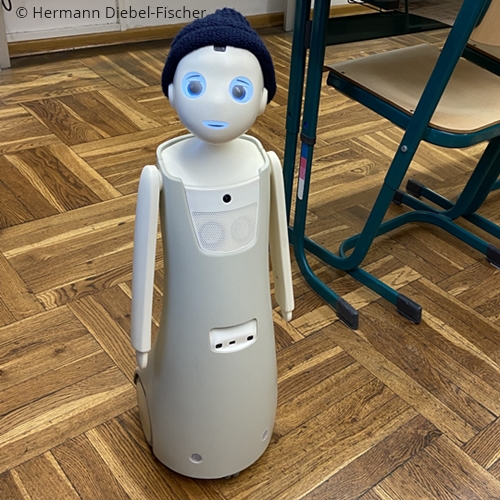Robot Navel as a Companion in Religious Education
Title: Robot Navel as a companion in religious education. A series of lessons on the topic of ‘prayer’ in a 6th grade class at a Protestant secondary school in Siegen and Dresden – perceptions and experiences.
Project duration: 02-2025 to 12-2025
Research Area: Responsible AI, Societal Relevance of AI, AI in Religious Education
Artificial intelligence (AI) is becoming increasingly important in education. Generative AI applications and social robotics are opening up new didactic perspectives in the classroom. While AI-supported robotics is already being researched in nursing and psychotherapy, its use in a school context – and especially in religious education – is still a young field of research.
The project involves the departments of Theology and of Business Informatics at the University of Siegen (Fabricius, Wieching) and the Theology department at TU Dresden, together with ScaDS.AI Dresden/Leipzig (Platow).
Aims

The project aims to investigate the AI-supported robot Navel (navel robotics) in Protestant religious education. The goal is to gain initial insights into the perception, acceptance and to value the religious educational benefit of the robot as a conversation partner in the subject area of ‘praying’.
Problem
How do pupils experience the robot as a conversation partner on the subject of prayer? How does the robot influence reflective performance and the depth of the learning process? What criteria and limitations determine acceptance and interaction?
Practical example created during the project
The teaching series comprises four to five lessons based on the curriculum of the respective state. It is being conducted in the sixth grade of a Protestant secondary school in Siegen and Dresden.
Technology
The robot is about one meter tall. It can be controlled via an interface, but its movements are limited. Sensors, cameras and microphones enable it to turn its head and eyes towards the most engaged user. Speech recognition, text-to-text transformation and speech generation are processed externaly.
Outlook
The findings will contribute to the development of quality standards for the use of AI in religious education and strengthen reflective, critical media education.
Publications
The team plans papers and articles in technical journals and literature to reflect perspectives of the HCI side, the educational and theological aspects.
Team
Lead
Team Members
Partners



